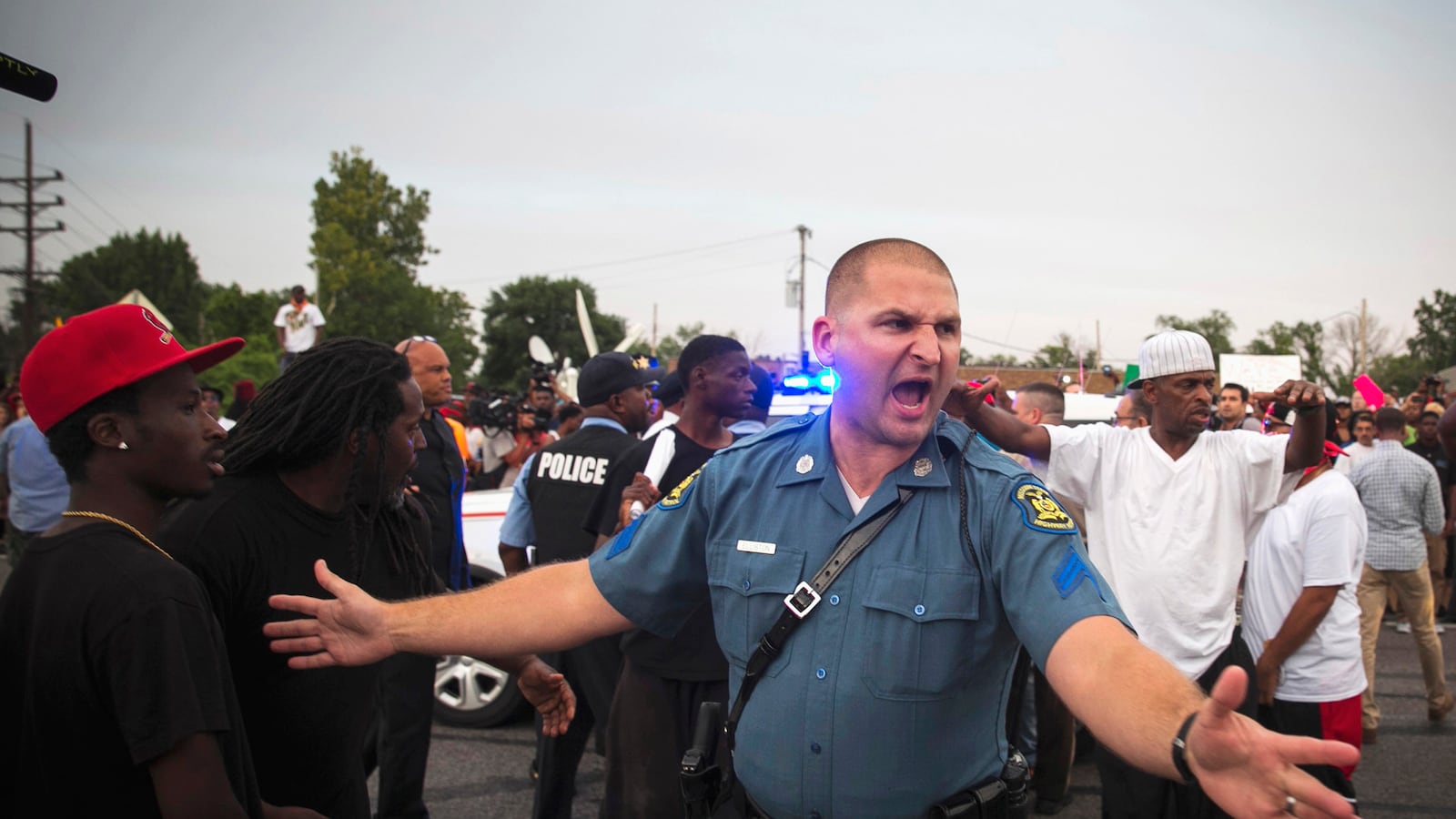Who knew that the police actions in a suburb of St. Louis of 15,000 people would suddenly reveal many of the deep fissures that have bedeviled America for a long time?
Front and center, of course, is the issue of race, a constant in America since it decided to break away from the British Empire and to stand on its own 238 years ago. There is the tension over the militarization of local police, which has performed the amazing hat trick of uniting liberals, conservatives, and libertarians behind the notion that America has lost its damn mind. And finally, there is the trampling of the First Amendment when cops find that it is judicious and no one will care as long as the folks they are attacking are seen as worthless lawbreakers.
It’s cute to think of the United States as a nation that has its stuff together and doesn’t have to contend with the kind of fighting in Israel and the Gaza Strip or the battles being waged in Iraq. No, Americans aren’t setting up IEDs and car bombs, or kidnapping hundreds of girls. But we are a nation at war with itself, and it plays out again and again when a Ferguson or a Bundy Ranch becomes a staple on cable news.
Race. Enough with that post-racial crap. That was a media-driven line that never was real and was stupid in the first place. We have been long taught that the issue of race and slavery came to a boil when Abraham Lincoln was elected president, but Gerald Horne argues in The Counter-Revolution of 1776: Slave Resistance and the Origins of the United States of America, that the question of slavery was a driving force behind the Revolutionary War. Horne argues that with the abolition of slavery coming to fruition in England and among other British colonial holdings, the American colonies wanted to maintain the lucrative slave trade and thus chose to go to war in order to do so.
Ever since, America has grappled with its race problem, so it’s not shock that Ferguson, Mo., a once all-white enclave, would all of a sudden be still dealing with race now that the city is two-thirds Black.
Yes, Michael Brown was an 18-year-old black teenager shot and killed by a white Ferguson police officer. But the animosity between the community and law enforcement is nothing new.
The family of Eric Garner is still trying to ascertain why a NYPD police officer used a banned chokehold to take him down, leading to his death.
In Los Angeles this week, Ezell Ford was gunned down, and he, like Brown, was unarmed.
This feeling of anger and dissension between the police and African Americans is nothing new, and it’s not going to get better any time soon.
Even Kentucky Republican Sen. Rand Paul, who has made outreach to African Americans a cornerstone of his efforts the last several months, sees the connection.
“Anyone who thinks that race does not still, even if inadvertently, skew the application of criminal justice in this country is just not paying close enough attention,” Paul wrote in an essay for Time: “Our prisons are full of black and brown men and women who are serving inappropriately long and harsh sentences for non-violent mistakes in their youth.”
But there are always silver linings. When Missouri’s Democratic Gov. Jay Nixon got lots of pressure to do something about the menacing Ferguson police, he replaced them with Missouri State Patrol Capt. Ron Johnson. He brought a deft touch in handling a powder keg, and overnight, reduced the boiling temperatures that was close to putting Ferguson on the path to a fiery explosion.
Johnson, who grew up in the area, is African American. He knows what the protesters were thinking and feeling. But maybe if Ferguson police chief Tom Jackson didn’t have 50 out of 53 of his police officers being white, relations there might be a helluva lot better.
Cops playing soldiers. Watching the Ferguson police with their armored vehicles and dressed like they were about to take down Al-Qaeda in Kabul shocked many people. But for a good portion of the nation, it was not stunning to see what has been described as the militarization of our police forces.
The Department of Defense has used the nation’s surplus military equipment to outfit local agencies with the latest military hardware. So instead of the police mantra to “protect and serve,” it has evolved into something akin to “take down and destroy.”
Whether it was the War on Drugs or the Patriot Act as the main culprit, the situation has gotten out of hand. When the media show the hyper actions of these wannabe soldiers, public perception changes. And with people from different ideologies realizing that something must be done, we might finally see Congress take substantive action.
It’s First for a reason. When did Ferguson reach the tipping point that angered American officials so much they said new leadership was needed on the ground? The tear gassing of protesters assembled in the street and the arrest of journalists Wesley Lowery and Ryan Reilly.
If there is one precious commodity for America, it is our touting of the First Amendment. Yet what we have seen in other cities played itself out in Ferguson: when facing bad news, authorities stop folks from protesting and shut out the media.
A crew from Al Jazeera-America said they were targeted with tear gas, and we saw police dismantling their cameras and lights. Other journalists reported being accosted by police.
Bottom line: The First Amendment is there for our protection, and it deserves to be utilized by all.
“The law enforcement response to these demonstrations must seek to reduce tensions, not heighten them,” Attorney General Eric Holder said in a written statement. “Those who peacefully gather to express sympathy for the family of Michael Brown must have their rights respected at all times. And journalists must not be harassed or prevented from covering a story that needs to be told.”
The anger in Ferguson only proves to all of us that as a nation, we have a lot of work to do to overcome our mistrust, our anger, our resentment and our fears. Only by confronting them can we change. Otherwise, we might as well prepare for another Ferguson, then another, and then another.





